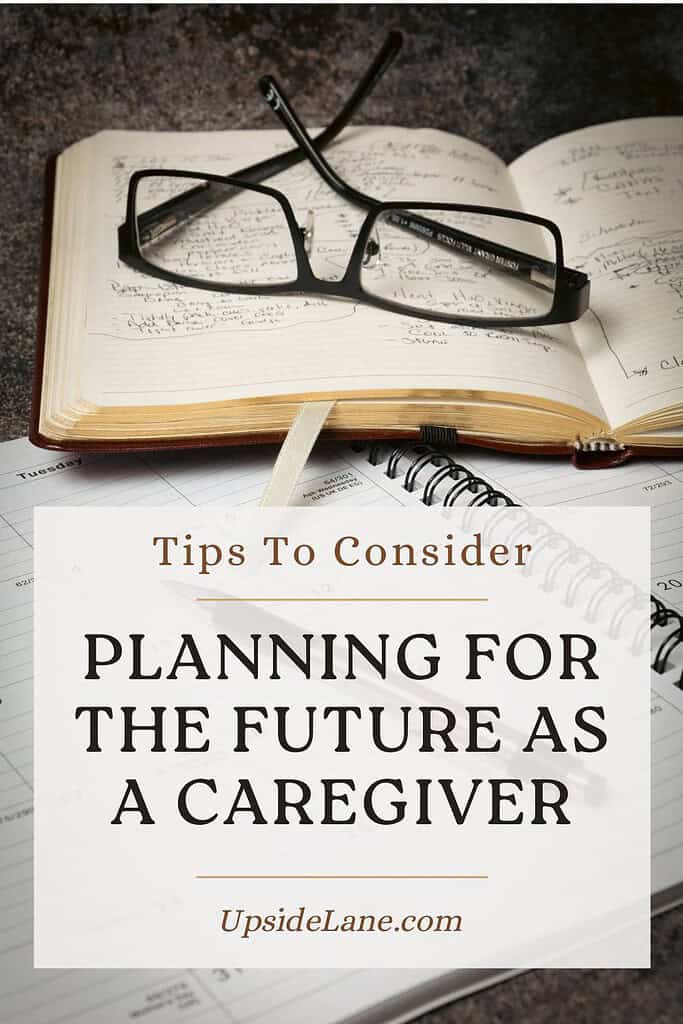Planning For The Future As A Caregiver: Tips To Consider
Essential tips for caregivers on planning for the future. Financial, personal health, and caregiving strategies to ensure a balanced life.

Caring for a family member with a disability or chronic disease can be deeply fulfilling but also a challenging responsibility. As a primary caregiver, we devote time and energy toward their well-being, yet it is important to remember that planning for the future, for ourselves and our good health, is just as important.
Planning for long-term goals on top of balancing the daily routine of caregiving can feel overwhelming but taking a few thoughtful steps will help to build a solid plan, and put you on the best path toward a fulfilling and good life.
This article offers essential guidance for caregivers on planning for the future, emphasizing the importance of creating a comprehensive long-term plan that addresses financial security, personal well-being, and the specific needs of the ones we care for.
The Importance Of Planning For The Future
Planning for the future isn’t just about finances. Future planning encompasses all areas of life and helps to ensure a secure and fulfilling future.
For caregivers, planning for the future becomes even more important due to the unique challenges and demands of the caregiving role. This includes addressing future needs such as healthcare, retirement, and personal well-being.
When Doug was first diagnosed with Parkinson’s, it felt like my entire future became hazy. I could no longer envision what my future was going to look like and, to be honest, I kind of didn’t want to.
It took some time for me to find my footing but when I did, planning for the future became a priority. I won’t say I have it all figured out and, as with Parkinson’s, things change and I have learned I need to be flexible.
That said, when caregivers take small manageable steps and perhaps seek support through public services and/or financial professionals, they help to ensure a balanced and fulfilling life while preparing for the future.
How Do I Begin Future Planning?
Once I got my head wrapped around Doug’s diagnosis and what my own future might look like, I began to think about future planning and took baby steps toward developing a life plan.
When planning for the future, it is important to assess your long-term goals and think about what you envision for your future.
This could involve career path considerations, financial stability, or personal aspirations.
Small steps in the planning process can significantly improve your quality of life over time.

Planning For Stages Of Life
Various stages characterize life, and each stage brings its own set of needs and challenges.
As a caregiver, it is important to plan for these stages, to ensure you and the ones you are caring for are supported.
When you are making future plans, consider how the caregiver role might evolve and how you can best adapt to these changes.
Creating A Long-Term Plan
A long-term plan should address several key aspects.
Financial Security
Working with a financial professional can help with creating a budget that includes your current expenses as well as your future needs. This could involve planning for retirement, emergency funds, insurance policies, and even public benefits if applicable.
Consider setting up a succession plan to ensure your loved one will be cared for if you can no longer do the caring.
This may not be an easy discussion to have with the care recipient or other family members but it is important and should be addressed.
Career Path
Your role as a caregiver might affect your career path and earning potential. Consider how you can balance your career aspirations with your caregiving responsibilities.
For me, thinking ahead and adjusting my work to remain flexible for both my future and my caregiving responsibilities became a top priority.
This is a major reason why I started my own business as a Lifestyle Medicine Nurse and Health Coach, and it also contributed to our decision to move to the Cape to be closer to Doug’s family.
When looking at career paths, it is important to explore flexible work arrangements or additional training to help in managing your career while also fulfilling your caregiving duties.

Healthcare
When creating a long-term plan, it is important to evaluate healthcare options for both you and your family members.
This includes understanding public services available in the United States, such as Medicaid or other support systems for individuals with chronic or developmental disabilities.
When planning, consider your future healthcare needs and those of the individuals you care for, as well as any potential changes in the level of care they might require.
Personal Well-Being
Your own health and happiness are crucial. Incorporate strategies for self-care into your daily routine to maintain physical and emotional well-being.
Regular breaks, hobbies, and social activities can help manage stress and contribute to a better quality of life, alongside eating nutritiously, engaging in leisure activities, maintaining friendships, and seeking community support.
Addressing The Care Needs
When caring for a loved one with a disability or chronic disease, it is important to develop a plan tailored to their specific needs as well as your own.
Consider yourselves a team, planning for the future together will help make the path forward more smooth.
Specific needs could involve many factors, here are several examples to consider.
- Special Services. With a little digging, you can find resources to support you, the caregiver, as well as the care recipient. Look into accessing public services that best suit you and your family’s needs.
- Support Networks. It can be incredibly helpful to find a network of support from other caregivers and professionals who understand the demands of caregiving and its responsibilities.
- Advocacy and Rights. Staying informed about the rights and resources available for those living with disabilities or diseases, as well as for caregivers, can enhance overall support.
Remaining Flexible To Change
As a busy caregiver, remaining flexible when planning for the future is crucial due to the ever-changing nature of caregiving.
Unexpected changes in the health, or needs, of the one you care for can require significant adjustments to your plans.
When we build flexibility into our strategy, we can more easily adapt to new challenges. This flexibility ensures we can continue to provide effective care while also taking care of our own needs.
Remaining flexible also allows us to accommodate the inevitable changes that will occur in our own life circumstances.
Life events such as career transitions, family dynamics, or our personal health can impact us as caregivers and affect our future plans.
Remaining flexible not only helps in managing stress but also promotes a balanced and fulfilling life. This approach allows us to support our loved ones while also continuing to pursue our own long-term goals.

5 Small Steps Toward Big Goals
While the planning process might seem daunting, breaking it down into smaller, manageable steps can make it more achievable.
Here are 5 small steps you can take toward creating big goals and planning for your future.
- Assess. Start by evaluating your current situation – your responsibilities, financial status, and personal needs. Create a list of your immediate and long-term goals based on any changes or improvements you’d like to see in the future.
- Check-Ins. Set up regular times to review and adjust your plans, this could be monthly or quarterly. Reassess your goals, update your budget, and address any new changes or challenges in your caregiving situation.
- Support Network. Create a support network that works for you. Identify and connect with resources, groups, communities, services, and professional advisors as you see fit. Build a supportive network to help you manage your caregiving role more effectively.
- Wellness Plan. It is critical to develop a health and wellness plan and to incorporate self-care into your routine daily. Set aside time for activities you enjoy and that promote a sense of well-being. Prioritize regular health check-ups, nutrition, and quality food, as well as sleep and stress reduction techniques.
- Backup Plan. Preparing for potential changes in your caregiving situation by developing a backup plan can be just as powerful as developing the original plan itself. Knowing you have “backup” relieves some of the pressure you may be feeling as a caregiver. Look to arrange backup care options, and financial alternatives, as well as discuss your future needs with other family members or individuals.
You may find it helpful to set short-term objectives that align with your long-term goals. Celebrate progress along the way, and adjust your plans as needed to stay on the right path. You’ve got this!
Enjoying Personal Experiences
Amid the challenges of caregiving, it’s important to find joy and fulfillment.
Work on incorporating activities and experiences that bring happiness into your life. This could involve spending quality time with loved ones, pursuing hobbies, or exploring new interests.
For my peace and fulfillment, I enjoy walking the beaches of Cape Cod whenever I get the chance.

When leaving the house becomes too difficult, I make time for some form of exercise, whether it is lifting light weights or stretching. Additionally, I find the most peace and calm through journaling.
These are just a few examples of activities that can help you find your center on a daily basis.
A balanced life plan should include both responsibilities and personal joys. This is an important point to remember when you are planning your goals for the future.
Create A Balanced Future In Caregiving
Remember, the planning process is not a one-time event but rather an ongoing journey.
Review your plan regularly, and adjust as needed. With a solid plan in place, you can ensure a good life for you as a caregiver and for those you care for.
By staying proactive and flexible, you can navigate the changes of your future as a caregiver with confidence, and maintain a sense of balance in your life.
I encourage you to begin planning today to ensure a more bright and manageable future for both you and your loved ones.
More Helpful Articles
- Bible Verses For Caregivers – Encouraging Scriptures
- Intermittent Fasting Vegan Meal Plan & Complete Guide
- The Power Of A High Fiber Diet Plan For Caregiver Health
- How To Use A Sauna: Health and Safety for Beginners
- 5 Simple Tips For Staying Fit As A Busy Caregiver
Additional Support for Caregiver Health
Let’s Connect
I hope you enjoyed this article on planning for the future as a caregiver, and you found the information helpful.
Thinking about our future as caregivers for those with chronic diseases or disabilities can be challenging and is not always fun.
However, taking the time to plan and set long-term goals for yourself and your loved ones will help you feel more confident and encouraged as you move forward.
Approach this task one step at a time by creating your plan gradually with small, manageable steps.
This will make the process feel less overwhelming, and afterward, when your plan is complete, you will be glad you took the time to do it.
QUESTION: What small step can you take today to begin developing a plan for your caregiving future?
Let me know in the comments section below. I’d love to hear from you.
Also, please consider sharing this article with friends and family, or anyone you feel would find it beneficial.







This is such an important step that I think many people miss. Thank you so much for sharing.
You are most welcome. Yes, it is easy to sweep this under the carpet…ugh. Thank you for your support.
Great post—and so very important! My husband and I have talked extensively to our children about the plans if we ever come to this. We also have things notated and made sure we have a living will drawn up. Not to mention, my husband knows what each other’s wishes are in the event that one of us passes.
Yes, yes, YES! Us too – with our kids, with each other, with family. And the living will is vital. Appreciate your comment and your support!
Great info, I will keep in my arsenal for the future!
Thank you Ash, appreciate the support.